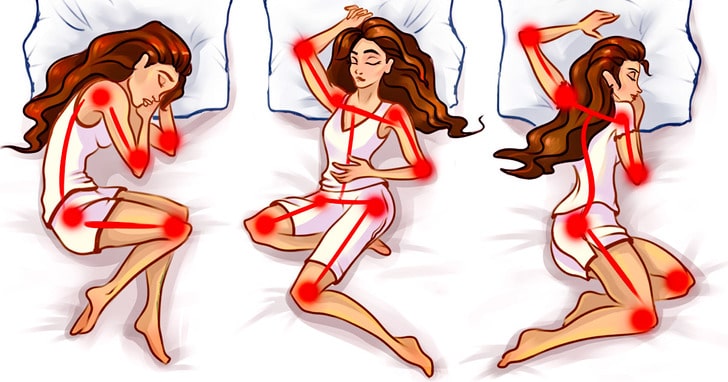Even if you go to bed at different times each night, chances are you stay in your favorite sleeping position every time you go to sleep. While your preferred sleeping position can definitely comfort you, it can end up causing you some health problems, from snoring to pain in different parts of your body.
We set out to find out which sleeping positions might offer the most health benefits, and which ones are best avoided.
Sleeping On Your Back

While sleeping on your back can help keep your skin wrinkle-free longer, it’s not the best position if you’re suffering from lower back pain, as it can make your current condition worse. And if your partner keeps complaining about snoring, sleeping on your back might not be the best position, as it can also make sleep apnea worse.
But if you’ve ever woken up with nagging neck pain, sleeping on your back can be helpful because it keeps your head, neck, and spine in a neutral position, helping you avoid painful sensations in your neck area.
Sleeping on your back is also not recommended for pregnant women as it can restrict the flow of blood and oxygen to the baby.
Sleeping On Your Left Side

Staying hydrated and eating enough fiber can definitely benefit your digestion, and sleeping on your left side can also help regulate your bowels. When you sleep on your left side, gravity stimulates normal bowel movements, helping you get to the bathroom first thing in the morning.
In addition to relieving constipation, sleeping on the left side is believed to be most beneficial to your health and can relieve back pain.
Sleeping On Your Right Side

If you often feel like your heart skips a beat, cutting out caffeine and finding a healthy way to deal with stress is the right step to take. In addition to these lifestyle changes, sleeping on the right side can also be beneficial for your heart.
Choosing to sleep on your right side can protect you from heart failure and other heart-related problems.
Sleeping On Your Stomach

While sleeping on your stomach can reduce snoring, it has many drawbacks compared to other sleeping positions. By disrupting the neutral position of the spine, sleeping on your stomach can cause back, neck, and shoulder pain, and can even cause your skin to age faster.
What sleeping position do you prefer? Have you ever tried to change it for the sake of your health?









Leave a Reply